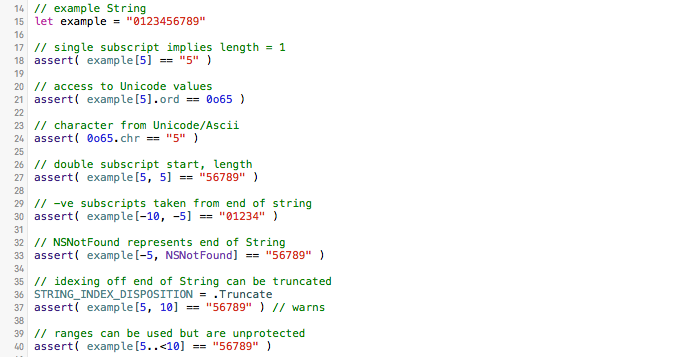RubyNative is a port of the Ruby core api to Swift intended to be used with Diamond script interpreter or any Swift Program that would like simpler access to file i/o than is offered by Foundation kit. It also extends Swift's String and Array classes and will provide a well integrated Regexp class to take the burden off the programmer dealing with uncompromising Swift Strings.
Why port Ruby to Swift? Using a strictly typed and scoped language for scripting avoids may of the pitfalls of a dynamic language and allows for auto-completion when working in the editor. This makes your scripts run faster in terms of developer time and very much so at run time. The languages are also a good fit syntactically.
Seems like a lot of low level UNIX code? We chose to stay close to the metal and the Ruby apis seem based on the POSIX interface. It is also not clear Foundation will be available when Swift is released for Linux. For now the project has minimal dependencies on Foundation classes NSURL and NSRegularExpression for things that it would not be worth replicating until the smoke clears for Swift on Linux.
At this stage, Ruby's Dir, IO,
File, StringIO,
Time and Stat classes have been implemented.
These classes follow the original documented functionality as closely as possible.
Input arguments are generally protocols such as string_like or data_like
to allow for automatic conversion between types. Return values are concrete
types String Int, Float or Data or an instance.
A flavour of the common Ruby idioms implemented in Swift thus far is given below:
SwiftRuby has avoided using operator overloading as much as Ruby with one exception: subscripting when working with Strings. There are two general forms. Subscripting with integers to extract ranges from Strings and subscripting with Strings to provide a succinct syntax for Regular Expressions.
At danger of unpicking the sterling work Swift has done to protect us all from String internals simple extensions have been defined to make scripting easier:
If you think about it, the logical index into a string is a Regexp. Ruby toys with this idea but SwiftRuby takes this much further. This is best explained by the following examples:
SwiftRuby is also available as a CocoaPod for use without using the Diamond script interpreter and is available under an MIT License. If you have any comments or suggestions, the authors can be contacted on Twitter @Injection4Xcode.


